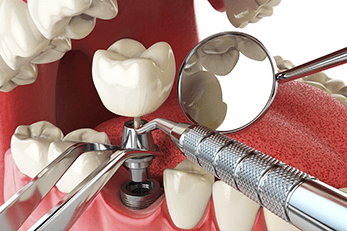What are Dental Implants?
Dental implants are replacement tooth roots. Implants provide a strong foundation for fixed (permanent) or removable replacement teeth that are made to match your natural teeth.


Success rates of dental implants vary, depending on where in the jaw the implants are placed but, in general, dental implants have a success rate of up to 98%. With proper care (see below), implants can last a lifetime.
Advantages of Dental Implants
There are many advantages to dental implants, including:
- Improved appearance: Dental implants look and feel like your own teeth. And because they are designed to fuse with bone, they become permanent.
- Improved speech: With poor-fitting dentures, the teeth can slip within the mouth causing you to mumble or slur your words. Dental implants allow you to speak without the worry that teeth might slip.
- Improved comfort: Because they become part of you, implants eliminate the discomfort of removable dentures.
- Easier eating: Sliding dentures can make chewing difficult. Dental implants function like your own teeth, allowing you to eat your favorite foods with confidence and without pain.
- Improved self-esteem: Dental implants can give you back your smile and help you feel better about yourself.
- Improved oral health: Dental implants don’t require reducing other teeth, as a tooth-supported bridge does. Because nearby teeth are not altered to support the implant, more of your own teeth are left intact, improving long-term oral health. Individual implants also allow easier access between teeth, improving oral hygiene.
- Durability: Implants are very durable and will last many years. With good care, many implants last a lifetime.
- Convenience: Removable dentures are just that; removable. Dental implants eliminate the embarrassing inconvenience of removing dentures, as well as the need for messy adhesives to keep them in place.
Key Terms for Dental Implants
Abutement
An abutment is a connector that your dentist will build into or attach to the top of your dental implant. This serves as the attachment for the replacement tooth, crown, or bridge, keeping it firmly in place.
Abutement Teeth
This term refers to the teeth that support a bridge or partial denture. The bridge is attached to the abutment tooth during a full crown prep or inlay/onlay preps. For a partial denture, clasps or rests are used to support the denture on the abutment tooth.
Ceramic
Ceramic is a material used to make dental implants. This material is made of clay and hardened by heat before it’s placed in your mouth. Some people prefer the aesthetic appeal of ceramic to titanium since it offers a more natural look. It’s available in ivory so it looks similar to existing teeth and roots. Some ceramic implants have conical threading at the base for easier attachment to the bone in your jaw. You might also get a ceramic implant if you have an allergy to metal.
Crown
A crown, also referred to as a cap, replaces a single tooth. If you have lost or broken a tooth due to infection, decay, injury, or other health problem, a dentist can fit your mouth with a crown to replace the missing or damaged tooth. Crowns typically fit over the top of existing teeth, although they must be ground down to fit, or attach to the abutment of a dental implant.
Implant
A dental implant, also called a fixture, is a medical device that interfaces with your jawbone to support a dental prosthesis, such as a bridge, crown, denture, or other facial prostheses. Through osseointegration, the implant will fuse securely to your bone, providing a strong and durable result that will last for years. Many dental implants last for patients’ entire lives, making them better options than bridges, which may require replacement, and dentures, which can be uncomfortable and difficult to wear.
Endosteal Implant
The endosteal implant is the most commonly used type of implant exercised in modern dentistry, according to the American Academy of Periodontology. In order to fit this style of implant, a dentist will place small screws, plates, blades, or cylinders directly into the jawbone through a surgical procedure. Each implant can hold at least one prosthetic tooth.
Titanium
Most modern dental implants are made of titanium. This metal comes with a number of advantages. Few people are allergic to titanium, so it’s rare for a patient to have a reaction to this material. It’s also lightweight but very strong, reducing the weight on your bone or within your mouth. It has a high oxygen affinity, which means that it will form a thin oxide layer when placed in the body. Titanium can also ossify with bone, producing a stronger result that can last for many years.
Zirconia
A small percentage of people do experience allergies to titanium, so zirconia is another option for the implant material. Zirconia implants have no prosthetic connections, so the risk of bacteria growth is lower. Patients may experience better gum health when they have this type of implant. It’s also white in color so it looks more like a natural tooth.
If you still have questions about dental implants or terminology, talk to one of our experienced dentists to learn more. Here are all of our dental implant dentists.
